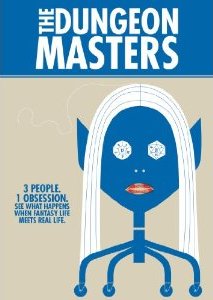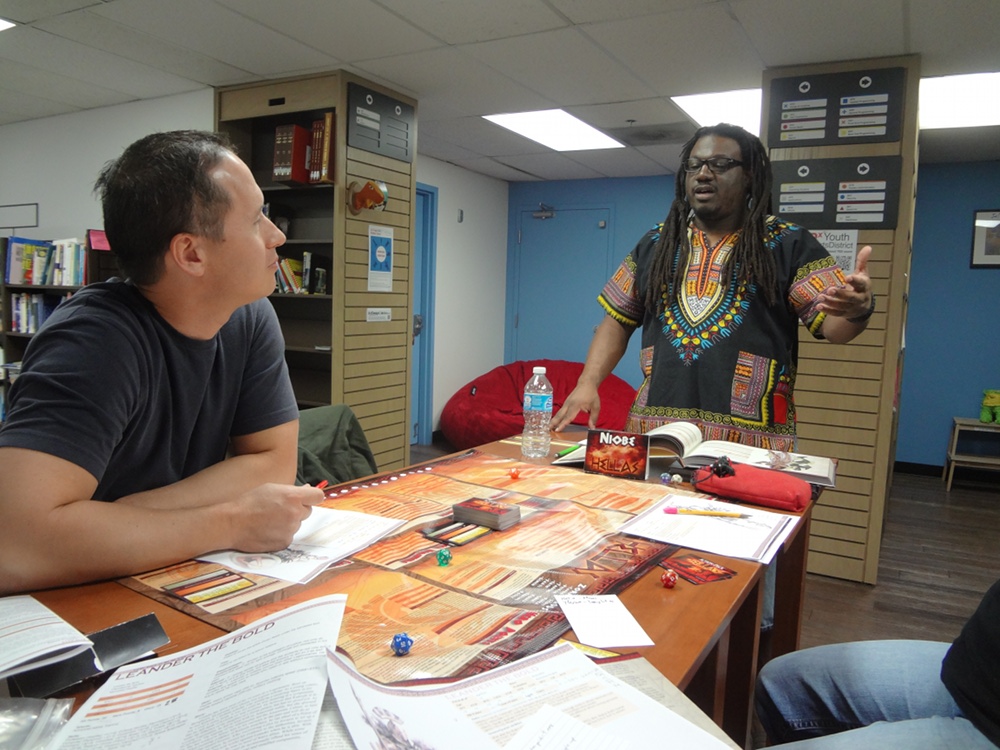DVD: The Dungeon Masters (2008)
 The Dungeon Masters is a depressing documentary from 2008 about the depressing lives of three gamers. In form and style, The Dungeon Masters is everything a documentary should be. The visuals are excellent, with good establishing shots, steady camerawork, and zero confusion in transitions. As far as content and its subject matter, The Dungeon Masters is deceptively titled, especially for existing gamers who would imagine that the movie might actually capture what the role of being a Dungeon Master or Game Master is all about. The movie doesn’t go there. There aren’t topics like “Dealing with Problem Players” or “How I Became a DM”. Even if “Dungeon Master” is taken to be about being a master of Dungeons & Dragons, the title is way off and sure to arouse the ire of even casual D&D players.
The Dungeon Masters is a depressing documentary from 2008 about the depressing lives of three gamers. In form and style, The Dungeon Masters is everything a documentary should be. The visuals are excellent, with good establishing shots, steady camerawork, and zero confusion in transitions. As far as content and its subject matter, The Dungeon Masters is deceptively titled, especially for existing gamers who would imagine that the movie might actually capture what the role of being a Dungeon Master or Game Master is all about. The movie doesn’t go there. There aren’t topics like “Dealing with Problem Players” or “How I Became a DM”. Even if “Dungeon Master” is taken to be about being a master of Dungeons & Dragons, the title is way off and sure to arouse the ire of even casual D&D players.
The only parts of The Dungeon Masters I can recommend are the opening Gen Con sequence and the filming at a LARP in Mississippi for four minutes. Otherwise the movie has little to do with gaming and too much to do with the dysfunctional lives of its three subjects. Even though it is only an hour and 27 minutes, The Dungeon Masters has the emotional impact of Sam and Frodo’s trek through Mordor and seems like a much longer film. At the same time, director Keven McAlester and editor Christine Khalafian vary the shots and cut between the subjects enough that the despair and loneliness never get tedious. Just when you think that you have a handle on each GM’s life and problems, there’s another horrible revelation or another misfortune waiting in the wings. Having seen it multiple times now, I would rather watch Precious or The Human Centipede again before I shoulder the burden of another viewing of The Dungeon Masters. Comic relief is sparse, unless you are laughing at a gamer’s expense. By comic relief, I mean that I chuckled when I saw that some school children were following the costumed Scott Corum along outside his son’s school, obviously fascinated by his strange outfit.
Keven McAlester’s film is so unflattering to its subjects and gaming as a whole that I give credence to claims that McAlester may have approached and edited the film with an agenda other than portraying the truth, but that is a subject for another day.
Gen Con
The first 13 minutes of Dungeon Masters is a captivating look at the three GMs in the context of the 2006 Gen Con and manages to capture as much of Gen Con in that brief time as Hobocon does in its entirety. The gloom of the rest of the movie is also absent in the Shangri-La that is Gen Con. Besides introducing the three DMs, there are interviews with many other gamers, gamers who do not appear later in the movie. For the most part, it’s also the most colorful and action-packed part of The Dungeon Masters, as the camera focuses on costumed attendee after costumed attendee, Gen Con’s opening balloons, and Cardhalla in an accurate encapsulation of the Best 4 Days of Gaming.
The LARP Segment
“When you played Cops and Robbers, you were LARPing. When you were playing dress up with your mom’s clothes, you were LARPing. When you were hiding them from your mom after you were done, you were LARPing and learning how to lie, which is a great LARP skill.”
– Jeffrey Ingram
The LARP segment is much briefer at only four minutes or so, but also embodies the sights and sounds of a LARP. Based on the reference to a Celestial column of magic and the called damage, the Live Action Role-Playing sequence seemed like a NERO LARP or an offshoot, which in fact it is. The LARP is Cerroneth, which is part of the SOLAR rules system. LARPer Jeffrey Ingram describes LARPing inclusively: “When you played Cops and Robbers, you were LARPing. When you were playing dress up with your mom’s clothes, you were LARPing. When you were hiding them from your mom after you were done, you were LARPing and learning how to lie, which is a great LARP skill.” In particular, I love how the camera captures the PCs spilling out of the tavern, surging forward as they do battle with the four undead who have come to harass the town. The drow of The Dungeon Masters, Elizabeth Reesman abandons playing her character to serve as a Monster Marshall; it would have been great if she had been asked to compare GMing tabletop games with GMing a LARP, but the closest the movie comes is Reesman’s love interest Jack Penton’s praise for her devotion as a DM.
The Dungeon Masters Themselves
GMing and role-playing are deeply personal and criticisms of one’s RP can be devastating. Players’ creative and intellectual reputations can be on the line. With that said, I have to imagine that any tabletop gamer watching The Dungeon Masters has had more meaningful and entertaining roleplay than the scant bit the film portrays. These are not masters of their craft. I think they would say as much themselves, despite their vanity. Role-playing is ultimately about FUN. D&D didn’t sell millions of copies without being fun, yet none of that is apparent watching the film’s three GMs at work.
Richard Meeks
Seattle-based Richard Meeks has what appears to be the most stable home life, working a 9 to 5 in the King County Waste Water Treatment Division and serving as a US Air Force reservist one weekend a month. His second wife doesn’t share his interest in gaming, much less seem interested by it. Meeks ranges from eccentricity to downright villainy. What will viewers remember him for? His nudist lifestyle, the emotional abandonment of his stepchildren from his first marriage, or for being a self-important party-killing DM? Meeks describes his party’s encounter with a Sphere of Annihilation as, “somebody got stupid and just decided to run through a door.” This is punishment from the DM though because Meeks “was just really mad that they were being so greedy” and therefore put an end to 7 real life years of adventuring for his Florida players. The camera catches Meeks’ journey out to Florida years later as he makes amends with a final game, letting his former players save the world of Greyhawk. Later though he sends a pissy email to his Washington players ending his campaign with them.
“You do not play Dungeons & Dragons to win or lose it in the Monopoly sense… You play the game for the experiences that you’re going to go through, not where it’s going to end up.”
– Scott Corum
I have only encountered Meeks’ brand of GMing once and it came as a shock. For most role-players, Scott Corum’s description of RPGs is accurate: “You do not play Dungeons & Dragons to win or lose it in the Monopoly sense… You play the game for the experiences that you’re going to go through, not where it’s going to end up.” Despite what Meeks says to the contrary about a GM not flaunting his power, for Meeks it is about winning or losing. His gamer friend questions whether he’s going to kill the party as Meeks reviews a Greyhawk module on public transit; he smirks in response. “Because If I don’t kill you by midnight then I haven’t done my job,” Meeks threatens his Washington players. While player death is a great motivator, for Meeks it seems to go much deeper psychologically. “But if I really wanted to, I could kill any of you and I know that,” he has to point out to his players, who admittedly seemed to be enjoying themselves. One of his Florida players finds this style to be fun, saying “Richard is a very entertaining Game Master. He has a real knack for making the player characters feel that they’ve accomplished something in some way.” In-character taunts are one thing, but most players I know would have nothing to do with a GM who taunts them out of character.
Scott Corum
Scott Corum overlaps with Richard Meeks in his own grandiosity. The creative and charming Corum is shown working on his modern day fantasy adventure book manuscript throughout the film. He also pursues his own program on the local cable access show in Torrance, CA. Besides a Strategicon DM t-shirt, Corum also has plenty of stories, divulging his teenage nickname “Sherlock”, his $50,000 in educational loan debt, and a background in puppetry. McAlester captures moments of domestic strife between Scott Corum and his more down-to-earth wife. When they’re not disagreeing with each other on camera, Corum has to ask whether the family can afford $20 so he can get new shoes at Payless. This trouble is compounded by his close attachment to one of his player’s wives, which comes to a head – on camera – when the player confronts his wife about her involvement with her “best friend” Corum. Corum is vague about what the exact trouble is. These unflattering moments could be studied in a psychology or sociology class and the term “emotional affair” might be used.
Corum is full of hopes and literary dreams, shedding tears when literary agent Denise Dumars telling him that she fell out of her chair after her professional reader read seven page’s of Corum’s book and told her “Buy it! The people who love The Da Vinci Code will love it.” Dumas continues to blow smoke up Corum’s ass, praising the first hundred pages of With a Single Wish Forever as “really, really good.” She goes on to relate a meeting she’s supposedly had with a Del Rey acquisitions editor who is looking for a series of books to buy and how she was thinking “Three book deal!” Consequently Corum praises her as the best agent in the world. In true Dungeon Masters fashion though, she calls and informs Corum that she hates his book. How she couldn’t have realized that from the first 100 pages, if she’d actually read them, is beyond me.
Elizabeth Reesman
It’s easy to forget that Elizabeth Reesman is a Dungeon Master, since only two minutes of her DMing are ever shown in the documentary. Instead McAlester focuses on her drow alter ego and her pillows stained with her black makeup. Living on the Gulf Coast of Mississippi, Reesman is recovering from Hurricane Katrina and there’s many shots of her environment to remind us of how far from cleaned up the region was in 2006. Why does Reesman play World of Warcraft in her full drow makeup in a motel room, the viewer may wonder as she does just that on screen. It’s one of the more puzzling scenes in the movie that hints at a fuller untold story. Almost every segment featuring Reesman, in fact, seems to center around her costuming and her putting her makeup on. Despite two boyfriends’ praise of Reesman’s gaming skills, she is never treated as Meeks’ or Corum’s gaming equal, though she shares in their cup of misery. Reesman’s ex-husband was violently abusive and she had a miscarriage the day after her wedding. She also fends off her employer’s sexual harassment and has trouble finding new employment.
The Mirror of The Dungeon Masters
Don’t we all know some fellow gamers like the three in The Dungeon Masters? If your pool of acquaintances is large enough, Meeks, Corum, and Reesman should be vaguely familiar. These are all people I would game with, even PK-happy Meeks. I have questioned when exactly it is that some gamer friends see their wives or children or have been startled to learn that they actually have them in the first place. I’m open to the idea that one of the reasons I might dislike The Dungeon Masters and find it so disheartening is that it hits fairly close to home. Meeks and Corum are both self-important and vain; I share in their egotism. I have ended a D&D campaign angrily, frustrated by competing distractions and I have to admit that in his aspirations, Scott Corum is a kindred spirit. Hell, I love UHF and have even dreamed of my own horrible public access TV shows over the years. Fortunately I just don’t have a documentary film crew capturing me at my worst (I leave that to my own writing).
In the end, I would rather escape and laugh along as fictional characters’ lives fall to pieces in movies like Observe and Report, Super, and Foot Fist Way than watch reality play out on screen as it does in McAlester’s film. The Dungeon Masters is worth visiting once, but then belongs safely below ground, locked away like the Tomb of Horrors that it is.

